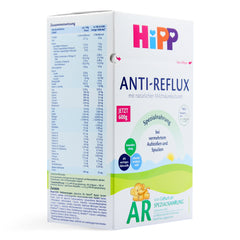Why Parents Trust Our Organic Baby Formula – Real Reviews and Results
When it comes to feeding their babies, parents become real detectives — they study ingredients, read reviews, and consult with pediatricians and experienced mothers. And rightly so! After all, what a child eats in the first months of life determines their health and development.
In recent years, more and more families have been choosing organic baby formula. But what is behind this trend? Is it just a fad or a truly informed decision? Why parents trust organic baby formula is a question that concerns many, especially those who are just starting out on their journey of formula feeding.
Today, we won't talk about the advantages from a marketing perspective. Instead, we'll share real stories from parents who have already made their choice and show the specific results of using organic baby formula. Because trust comes not from beautiful slogans, but from the experiences of real people.
What Makes Organic Baby Formula Different?
Today, parents prefer high-quality formulas for baby food. There are two main types: organic formula and conventional formula. Each of them differs in the composition of ingredients and production methods. Understanding the difference is of great importance for parents making feeding decisions. To choose high-quality organic formulas, parents can turn to Organic Life Start. Well-known European brands offer quality, safety, and essential vitamins for babies. Here is the key answer to the question "What makes organic baby formula different?":
Organic formula:
-
Organic formulas are made from cow or goat milk with strict organic standards. The milk is obtained from farms that avoid synthetic pesticides, growth hormones, and routine antibiotics.
-
Organic formula does not contain GMOs and focuses on high-quality ingredients. The formula has a natural composition created according to safety guidelines for baby development.
-
High-quality organic formula contains beneficial additives such as probiotics and prebiotics. The formula typically contains DHA and often ARA, healthy fats that are essential for brain and eye development in babies.
-
The formula is created according to the principle of closely matching breast milk composition. Safety and quality nutrients are key benefits of organic baby formula.
-
A quality organic formula contains fewer synthetic additives. Parents choose organic formulas with stricter production standards and environmental considerations.
Regular formula:
-
Regular formula is made from cow or goat milk from conventional farming practices. The formula meets safety standards but may use different production methods.
-
Regular formula can contain ingredients that are safe but not organically sourced. Sometimes, the formula contains corn syrup or certain soy-based ingredients as standard components.
-
The formula is safe and regulated, but it may contain sweeteners that some babies with sensitive digestion cannot tolerate well. In the question of organic vs regular baby formula, conventional options may include different probiotic profiles. The formula is made with standard fatty acid compositions that meet nutritional requirements.
-
Regular formula is more affordable for parents and often less expensive. However, some babies with particularly sensitive stomachs may respond better to organic alternatives.
Benefits of Organic Baby Formula According to Parents
An organic formula has several benefits that many parents report. Parents choose these products to potentially reduce fussiness and improve their babies' digestion. Honest reviews help to understand the reported quality and experiences with the formula. Certified organic formulas are often chosen by parents seeking specific benefits. Parents select formulas for newborns based on individual results and needs. Some studies suggest that organic formulas contain beneficial compositions of nutrients and substances. Here is the key information on the question "How do parents rate organic baby formula?":
-
Improved digestion. Enhanced digestion is frequently reported as an advantage of quality organic formulas. Today, many babies show sensitivity to specific components and substances in formulas. For fussy babies who experience reflux, HiPP Anti Reflux AR Formula is one popular choice. The formula contains gentle ingredients and specialized nutrition for babies.
-
Reduced fussiness. Another reported benefit is reduced fussiness and discomfort after feeding. Organic formula may help improve nutrition through the absence of certain artificial additives. Organic formula contains carefully selected and digestible ingredients that aim to mirror breast milk profiles.
-
Healthy growth and development. Healthy growth and development are primary goals of any quality formula. Organic formula reviews suggest that, thanks to the organic formula composition, some children show positive responses. The appropriate amount of probiotics, minerals, and beneficial fats may have positive effects. Children can achieve proper development according to their age milestones.
Which Organic Formula Do Parents Recommend Most?
Parents often choose high-quality organic formulas for their babies. Organic formula contains carefully balanced nutritional vitamins and minerals. It is not just about the standard composition, but about research-backed formulations and feedback from other parents. Parents try to maintain the right feeding experience that supports development and healthy growth of the baby. Today, European brands offer high-quality organic formulas with well-researched compositions. Here is the key answer to the question "Which organic formula do parents recommend?":
-
HiPP formula. The formula is created to closely resemble breast milk for enhanced digestion. The formula contains beneficial probiotics that help support digestive health. The formula is gentle and has a mild, natural taste. The formula avoids GMOs and artificial additives that may cause concerns for some parents.
-
Holle formula. The formula is a good choice for many health-conscious parents. The formula is certified organic and emphasizes quality and naturalness of the product. The formula contains a minimal ingredient list that may reduce discomfort during feeding. Parents choose this pure formula as it may be suitable for babies with sensitive digestion.
-
Kendamil formula. A popular organic baby formula for parents is Kendamil because of its whole milk base. The formula contains natural fats that serve as alternatives to palm oil. Usually, the formula has a smooth consistency and is mild in taste and smell. The formula contains essential vitamins and minerals for the growth and development of babies.
Safety, Quality, and Trust – Why Parents Choose Organic

Parents prefer proven options for baby nutrition. High-quality organic formulas contain carefully balanced nutritious vitamins, minerals, and probiotics. The formulas aim to closely mirror breast milk composition, which can be beneficial for babies. Organic baby formula with probiotics is one choice for supporting healthy growth and development of the child. After birth, babies need appropriate compositions of nutrients for proper growth and development. Here is what parents consider when choosing organic formulas:
-
Quality and oversight. Organic formula meets high quality standards and is monitored by relevant authorities. Organic formula avoids GMOs and minimizes certain additives. Synthetic pesticides and chemical fertilizers are restricted in organic production. A natural and carefully controlled product appeals to health-conscious parents.
-
Certifications. Certifications serve as evidence of quality and safety standards in formulas. Today, the presence of certificates helps verify different stages of formula production. Quality formulas can be good indicators of supporting infant health and development. Organic infant formula aims to meet the expectations of parents who prioritize natural options for their babies.
-
Safety and standards. Organic formula undergoes rigorous testing before being sold. The formula must meet European quality and international safety standards. The formula serves as a reliable option for feeding babies from birth. Safety and standards provide primary evidence for parents making informed choices.
Making the Right Choice – Tips for Parents
Health-conscious parents should understand the question "Is organic baby formula better?" and consider their individual circumstances. Organic formulas can be a good choice for parents prioritizing specific standards and ingredients. Following thoughtful advice will help make the right choice and support baby development. It is important for parents to check ingredients that align with their feeding goals. Probiotics can be important for development and growth in babies.
Consultation with a pediatrician is essential to evaluate the baby and their specific reactions. A pediatrician will help determine the most suitable formula for feeding individual babies. Quality organic baby formula for newborns can be an excellent choice for supporting healthy growth. Unlike conventional formulas, organic versions may appeal to parents with specific preferences. Traditional formulas are standard and affordable options that work well for most babies.









shrea kuile -
It is an informative and learning review on Organic Baby Formula. Thanks for publishing a very helpful topic. Parents should browse your blog to select safe and healthy food options for their children. I like your blog and also prefer organic products.